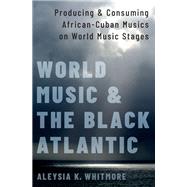World Music and the Black Atlantic Producing and Consuming African-Cuban Musics on World Music Stages
, by Whitmore, Aleysia K.- ISBN: 9780190083946 | 0190083948
- Cover: Hardcover
- Copyright: 5/26/2020
In the mid-20th century, African musicians took up Cuban music as their own and claimed it as a marker of black Atlantic connections and of cosmopolitanism untethered from European colonial relations. Today, Cuban/African bands popular in Africa in the 1960s and '70s have moved into the world music scene in Europe and North America, and world music producers and musicians have created new West African-Latin American collaborations expressly for this market niche. World Music and the Black Atlantic follows two of these bands, Orchestra Baobab and AfroCubism, and the industry and audiences that surround them-from musicians' homes in West Africa, to performances in Europe and North America, to record label offices in London. World Music and the Black Atlantic examines the intensely transnational experiences of musicians, industry personnel, and audiences as they collaboratively produce, circulate, and consume music in a specific post-colonial era of globalization.
Musicians, industry personnel, and audiences work with and push against one another as they engage in personal collaborations imbued with histories of global travel and trade. They move between and combine Cuban and Malian melodies, Norwegian and Senegalese markets, and histories of slavery and independence as they work together to create international commodities. Understanding the unstable and dynamic ways these peoples, musics, markets, and histories intersect elucidates how world music actors assert their places within, and produce knowledge about, global markets, colonial histories, and the black Atlantic. World Music and the Black Atlantic offers a nuanced view of a global industry that is informed and deeply marked by diverse transnational perspectives and histories of transatlantic exchange.
Musicians, industry personnel, and audiences work with and push against one another as they engage in personal collaborations imbued with histories of global travel and trade. They move between and combine Cuban and Malian melodies, Norwegian and Senegalese markets, and histories of slavery and independence as they work together to create international commodities. Understanding the unstable and dynamic ways these peoples, musics, markets, and histories intersect elucidates how world music actors assert their places within, and produce knowledge about, global markets, colonial histories, and the black Atlantic. World Music and the Black Atlantic offers a nuanced view of a global industry that is informed and deeply marked by diverse transnational perspectives and histories of transatlantic exchange.







